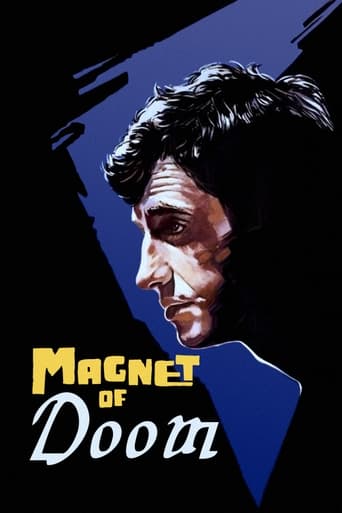khsooners
As some of the other reviews have already stated, the print of the movie that is available is very poor. So it is not quite clear whether Melville wanted to have the washed-out look of the picture or whether it is just plain bad quality. Even rare TV screenings do not offer an improved version (ARTE).
The relationship between the young ex-paratrooper/boxer/secretary (Belmondo) and the old bank owner/colonial adventurer (Vanel) is quite interesting and also stands for the generational conflict of the 1960s. Obviously, some of the plot is somewhat stretched but the tension between the main characters is excellently played out. Melville wanted Spencer Tracy for the Vanel part, but Tracy's health situation made any form of outdoor filming (not to mention insurance for this) Impossible. Belmondo, who is fooling around in Godard's "Breathless" and posing as a Bogart style tough guy, really plays a film noir character in this one. The way he treats his girlfriend at the beginning of the movie makes his protagonist almost unlikeable. In the damp Louisiana setting at the end of the movie, the whole affair really turns into a veritable noir.
chaos-rampant
I must confess I was terribly excited at the prospect of Jean-Pierre Melville tackling the road movie. If a director was ever suitable for taking on his back the existential baggage usually associated with that particular sub-genre, that's old Jean-Pierre. But in the same time, nine out of ten times there's a reason why certain films of a director's ouevre receive all the plaudits while others tend to languish in obscurity. Simply put, Magnet of Doom is not among Melville's finest - probably not his worst either. It's just too awkward and clumsy to ever be truly successful from an artistic or technical standpoint and even though fans of the director will take pleasure in witnessing the early nurturing of those same ideas, themes and moods that would later transform into what became his signature style, Magnet of Doom lacks the singularity of purpose and stylistic confidence of something like Le Samourai. Melville weaves the plots of two characters, an amateur boxer scraping to get by after his boxing career goes down the drain and the stalwart, rich businessman on the run from the law (presumably for someone's murder) who hires the first as his secretary and travel companion, into a road movie that takes us all the way from the petit bourgouisie cafes of France to Manhattan to the Deep South and bayous of New Orleans. If you can forgive the wooden delivery and stilted dialogue American non-actors are saddled with, the choppy editing, the occasionally clumsy and haphazard camera-work, there's quite a few things to appreciate. Melville's guerilla tactics as he samples New Orleans nightlife with a camera shooting from the open car of a moving vehicle, the documentary style of his footage of empty highway stretches, slick diners, smoky bars and neon motel signs, small parts of a puzzle that in clicking together form a different kind of Americana. One seen through the eyes of a European not necessarily fascinated with what he sees. If the boxer's fixation on Frank Sinatra, the son of Italian immigrants much like himself, symbolizes the mythic quality of the New World, a motley assortment of thieving hitchhikers, soldiers spouting racial slurs and opportunist, murderous bar owners reveals the seemy underbelly of the American Dream.Behind the slow-burn atmosphere however, behind the minimalism of the plot, the sparse dialogue, the intimacy of the monologues, all typically Melvillesque ideas and themes that would later resurface in a more refined, surefooted form, there's not much of a story to speak of. Not only is the plot stretched pretty thin, not only does it suffer from one too many improbabilities (not plot holes necessarily but little distractions that accumulate in the course of time) but it's handled in a somewhat awkward manner. The gradual shift of power in the duo's relationship, as one learns to experience freedom and the other comes to term with solitude, is not enough to carry the dramatic weight of the plot and beyond that there's not much of anything. And if Belmondo's character redeems himself in the finale for being a conniving, self-serving scoundrel for most of the film, he has the show stole from right under his nose by by the great Charles Vanel (Les Diaboliques, Wages of Fear, To Catch a Thief) who gives another terrific performance.
StevieGB
I saw this at London's National Film Theatre a couple of nights ago. The print, the best they could lay their hands on, was scratched and the colour had faded to the extent that much of it was a pinky sepia. Also, I could find very few reviews to read beforehand (zero on the IMDB). So I wasn't expecting much.And I was therefore very pleasantly surprised. The tale of an old crooked banker who absconds to the US with a young male golddigger really works. Charles Vanel (who was so brilliant in The Wages of Fear) and Jean-Paul Belmondo are a wonderful team, as a very spiky and spiteful Father/Son relationship grows between them.As a travelogue of a journey from New York to the Deep South it's fascinating, and reminded me, of all things, of Easy Rider, which I very much suspect it may have influenced.There's a few problems with it, mainly due to the fact the Jean-Pierre Melville never really got the timing right when it came to editing emotional scenes (especially at the end).But if you're a fan of the early Melville movies, Le Doulos in particular, then check it out.


